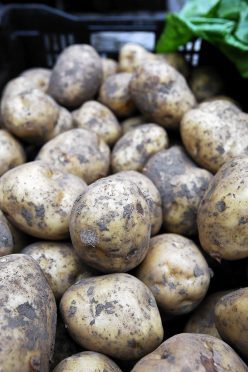Only six years after it hit the headlines it seems that English seed potatoes are once more being planted in Scottish fields.
Latest figures show that 18 ware crops north of the border were planted with such seed in 2016.
The practice is not illegal under EU plant health regulations as long as the crops are certified but it carries a huge risk of importing exotic bacterial diseases such as brown rot and ring rot.
This is especially the case if the seed has been once-grown in England from stocks sourced in the Netherlands or elsewhere in Europe. Experience shows that once these diseases become established in the environment, they are all but impossible to eradicate.
Colin Herron, general manager with the Montrose-based potato division of McCains Foods GB said: “It is vitally important that Scottish growers use only seed sourced in Scotland from growers in the Safe Haven Scheme. The last time this was an issue was in 2010 and once the problem was pointed out it was dealt with efficiently. It is disappointing to see the problem creeping back in again.”
Although the varieties and growers are not revealed, 2016 figures show of the non-Scottish grown seed, one stock was sourced in Northern Ireland, three were sourced from the Protected Region of England (Northumberland) and four from the Non-Protected Region of England.
This last stock, which was used to plant 12 of the 18 crops, poses the biggest risk according to Mr Herron.
Gerry Saddler, head of potatoes at regulatory and monitoring body Science and Advice for Scottish Agriculture (SASA) said : “Some of these crops are grown close to the English borders by companies with interests on both sides and some are small areas grown on trial for specialist uses such as organic production but I completely agree with the need to keep the pressure on growers not to take the risk of using seed sourced outwith Scotland.
“Careful sourcing is one of the only ways to keep exotic diseases at bay. It is not only brown rot and ring rot which are the worries. There are blackleg pathogens on the continent which we don’t have here and wouldn’t want to see introduced.”
Scottish seed potato specialist and chairman of AHDB Potatoes’ seed and export committee, Alistair Melrose, said: “I brought this up at a board meeting this week. It is very disappointing that this seems to have slipped below the radar after it being brought to the industry’s attention a few years ago. Some of the growers involved might not be aware of the risks they are running but there is no doubt sourcing seed from south of the border is not good practice.”
